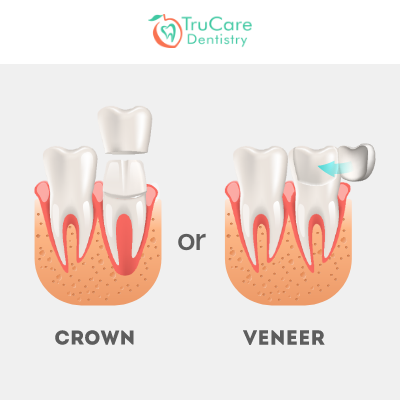
Dental veneers and crown essentially help to cover up a chipped, broken, or discolored tooth. Both are restorative dental treatments, and they are unique in their own way.
Most of the time, people get confused about choosing veneers or crowns. Here we are uncovering the key information about veneers and crowns so that you can select the best one and improve your dental health.
Let’s explore the details together!
What are veneers?
Dental veneers are very thin, custom-created shells of tooth-colored materials intended to cover the front surface of teeth. The primary aim of the Veneers to improve your appearance.
Dental veneers are usually made of porcelain or resin composite materials. Porcelain veneers work best as stains resistant. But, discuss with your dentist before selecting porcelain or resin Veneers for your teeth.
Use of Veneers
- Treat the discolored teeth
- Worn-down teeth
- Chipped or broken teeth
- Treat the misaligned, uneven, or irregular shaped teeth
- Close the gap between teeth
When you want to get dental veneers, it usually takes a couple of visits (around 3-4) to a dental clinic.
Benefits of Dental Veneers
- Natural tooth appearance.
- Gums can tolerate porcelain well.
- Porcelain veneers are stain-resistant
- You can select veneers’ colors to make dark teeth appear whiter.
- Not much shaping is required as crowns do
Cons of Veneers
- Veneers leave areas of your tooth exposed to new decay.
- Composite veneers are cost-effective but may only last 5 –7 years. Other materials may last longer but may need to be replaced.
- Veneers are not reversible.
- The cost for veneers may not be covered by dental insurance.
Now let’s explore the information about Dental Crowns.
What is a dental crown?
A dental crown is a tooth-shaped cap that covers the tooth. The primary aim of a dental crown is to restore a tooth’s shape, size, strength and enhance its overall appearance.
Crowns are the best choice when a tooth has badly broken or cracked or where root canal treatment has been required to treat tooth decay.
The crown keeps the tooth intact and shields it from any further damage that may lead to extraction. Once the crown is bonded firmly into place, it becomes the new outer surface for the tooth with the small part of the original tooth inside.
Use of dental Crown
- Protect a weak tooth from breaking
- Restore a broken or chipped tooth
- Cover a tooth with a large filling
- Hold a dental bridge in place
- Cover discolored teeth or dental implant
- Cosmetic modification for an improved smile
Types of Crown
- Metal
- Stainless steel
- Porcelain (fused to metal)
- Ceramic or Resin
Advantages of Dental Crowns
Dental crowns are perfect solutions for a wide range of dental problems:
- Support a tooth that is severely damaged by decay
- Hold a cracked or broken tooth together
- Guard a tooth following a root canal procedure
- Covers a dental implant
- Improves the appearance of a tooth
Cons of Crown
- The part of a natural tooth is removed to make space for the crown.
- Your crowned tooth may have sensitivity to heat and cold initially
- A porcelain crown is fragile and may damage over time.
- Porcelain fused to a metal alloy crown flaunts a thin dark line between the natural tooth and the crowned one.
Now that you have understood the comprehensive details about veneer and crown, you should have made up your mind. Nevertheless, it is advisable to consult your dentist, who can suggest the best options according to the condition of your teeth. For instance, when you have tooth decay and need a root canal procedure, crowns are the best alternative.
Want to improve dental health?
TruCare Dentistry offers comprehensive dental care treatment to improve overall oral health. From advanced infrastructure and instruments to highly qualified professionals, we serve the best possible dental care treatment. Whether you need treatment for tooth decay, whiten your teeth, or require more complex dental treatment, we can help.
Connect with us to get the best possible dental care to keep your teeth in good shape.
FAQs
1. Is it better to have veneers or crowns?
Both veneers and crowns are unique in their own way and have their respective strengths and weaknesses. Before making any decision regarding veneers or crowns, it’s best to visit a dentist and do as they prescribe.
2. What lasts longer veneers or crowns?
Crowns are stronger and more durable than veneer. The former can last from ten to 15 years. They can last for decades with proper care, oral hygiene, and regular checkups. Veneers usually last between five and ten years.
3. Are crowns on front teeth noticeable?
Tooth-colored crowns look and feel just like natural teeth. They give a natural appearance and blend well with the adjacent teeth.
4. Do they shave your teeth down for veneers?
Yes, some dentists shave the enamel during the preparation stage but it isn’t the only option. New technologies and innovative brands prevent the need for shaving or drilling before a veneer procedure.
